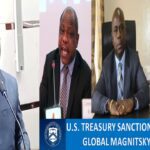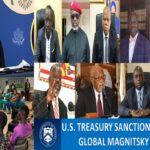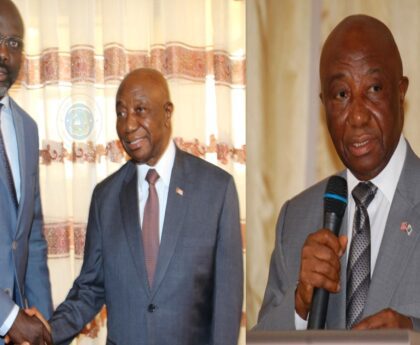CHARGE D’AFFAIRES CATHERINE RODRIGUEZ’S REMARKS AT PRESS ROUNDTABLE (DECEMBER 12, 2023)
DECEMBER 12, 2023
Good morning! Thank you for joining me today for our first press roundtable since Liberia’s successful presidential and legislative elections. It has been a historic period, so I want to begin by congratulating the Liberian people for demonstrating to the world your enthusiasm for your democracy by coming out and voting in large numbers. Liberia serves as an example in the region by conducting free and fair elections that were held peacefully. We congratulate the winners in the legislative elections, president-elect Boakai on his victory, President Weah for his peaceful acceptance of the results, and the NEC for the professional conduct and transparency of their work.
Now, I want to talk about how the United States continues to promote accountability, stand up for human rights, and fight corruption.
Last week on Friday, December 8, and yesterday, December 11, the U.S. Government sanctioned several officials using the Global Magnitsky Human Rights Accountability Act and authorities under section 7031(c) for visa restrictions. Calling out corruption and human rights abuse is a Biden Administration foreign policy priority that is advanced globally. In these most recent cases, the designations were the result of the official’s individual actions, not those of a political party or the country itself. For those individuals who have been sanctioned by the U.S. Department of the Treasury’s Office of Foreign Assets Control under Global Magnitsky, they and their families will no longer be able to utilize the U.S. banking system and they and their families will have a lifetime ban on visiting the United States. You can read more about these individual cases on the U.S. Treasury OFAC website. For those sanctioned by the U.S. Department of State under Section 7031(c), they and their families will have a lifelong ban from entering the United States. 7031(c) provides that, in cases where the Secretary of State has credible information that foreign officials have been involved in significant corruption or a gross violation of human rights, those individuals and their immediate family members are ineligible for entry into the United States.
Instead of focusing on these individual cases as that information is now public and published online, I want to speak to you about corruption and its impact on YOUR life and what you can do about it. I hear from my own employees and those Liberians I have met during my time here who tell me that their salary supports not only themselves and their children but also their extended family members who are unemployed. They grumble about paying taxes, they know it’s a necessity but ask, “where is the money going?”
Corruption doesn’t only affect your life today but also threatens your family’s future. The world is a global marketplace. Liberia, like other countries in the world, must compete for new business opportunities, for foreign assistance, and for international financing. The fortunes of all Liberians are squandered when government corruption becomes a factor in that decision making.
So, what can YOU do about it? The problem can seem intractable. Corruption has been around for thousands of years and exists in every society, including the United States. It’s not the fact that corruption exists that’s important, but rather what you do about it.
We are uplifted to hear that dealing with the pernicious issue of corruption is one of your incoming government’s priorities. Liberia should make it easier for regular citizens and honest government workers to report fraud and corruption. The good news is that Liberia DOES have institutions capable of investigating and prosecuting corruption and holding wrongdoers accountable. It DOES have institutions and procedures for ensuring transparent and competitive procurement of goods and services to ensure the best value for YOU, the citizens of Liberia. We have even witnessed a few successes as demonstrated with the Anti-Corruption Champion award bestowed upon Marc Kollie this year by Secretary Blinken for his fight against corruption.
However, a few successes here and there is not sufficient. What is needed is consistent political will within the executive branch and legislature to ensure these institutions have the support and resources they need to carry out the work they were created to do. There needs to be greater transparency in government, and YOU should know where YOUR tax money is going.
As members of the fourth estate, the Liberian media also plays an essential role in transparency, both by reporting important and accurate information, but also by reporting on how government funding is being spent and how it affects Liberians’ lives.
It is essential that when corruption is uncovered, action is taken. For minor incidents employees can be fired or disciplined, for major incidents they should face prosecution. When corruption goes unchecked at higher levels, it signals to everyone else that it’s ok to charge YOU extra for services you are already paying for through your taxes. Unchecked corruption, along with a lack of accountability becomes a corrosive force on society stifling the growth and advancement of YOUR family.
As one of your oldest and strongest partners in the international community, as an employer of hundreds of Liberians, and as one of your largest international donors, we are committed to the best for Liberia.
Thank you, and I look forward to your questions.




